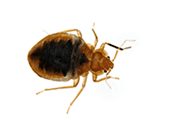The Factors That Make Bed Bugs Exceptionally Unique Insect House Pests
The common bed bug (Cimex lectularius) is one of the most frequently managed insect pest species within homes and buildings throughout the US, and many pest control professionals agree that bed bugs are the most difficult pests to eliminate from structures. The bed bug is a unique insect pest for several reasons. For one, the bed bug is one of the few bloodsucking arthropod pest species that does not transmit disease pathogens to humans, unlike mosquitoes, ticks, and kissing bugs. The bed bug is also the only arthropod pest species that relies primarily on human blood meals in order to survive, as all other bloodsucking arthropod pest species favor the blood of other animals over their occasional human hosts.
While bed bugs will reluctantly feed on the blood of pets like dogs and cats, they will only do so in a state of starvation when human blood meals cannot be obtained. Although bed bugs originally inhabited caves where they relied solely on bat blood for sustenance, they began feeding on more accessible human blood around 12,000 years ago when prehistoric man took up residence in caves. Given their reliance on human blood meals, bed bugs were forced to abandon their cave habitat in order to follow humans into their primitive earthen shacks and eventually into modern homes and buildings. Surprisingly, the bed bug is the only bloodsucking pest that dwells entirely indoors, which makes it one of the very few insect species that has become fully domesticated, the other two being the German and brown-banded cockroach pest species.
It is often said that bed bugs can survive for several months or even up to a year without collecting a single blood meal. While laboratory studies have demonstrated that a very small minority of bed bug specimens can live for up to 400 days in ideal environmental conditions, it should be known that bed bugs rarely survive longer than three months without a blood meal. However, when exposed to cold temperatures, bed bug metabolism slows, allowing the pests to survive for a longer period of time. Even if bed bugs were capable of surviving for six months without a blood meal, they would become progressively easier to detect and exterminate within homes. This is because going a mere few weeks without feeding causes bed bugs to become much less mobile, and perhaps most important, females cannot lay viable eggs without first obtaining a blood meal, and developing nymphs cannot progress to the next stage of their development without regularly consuming blood. Because of this, a bed bug population within a home will cease to grow, and will even degenerate without the regular consumption of blood meals.
Have you ever found what you believed were bed bug fecal spots on your bedding, mattress or furniture upholstery?


Comments are closed.